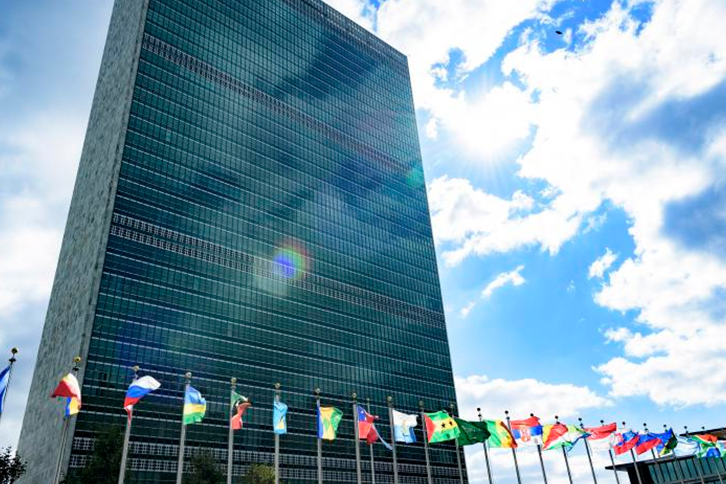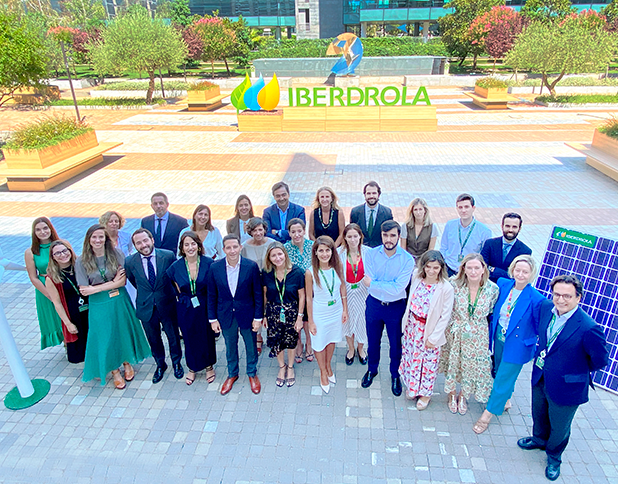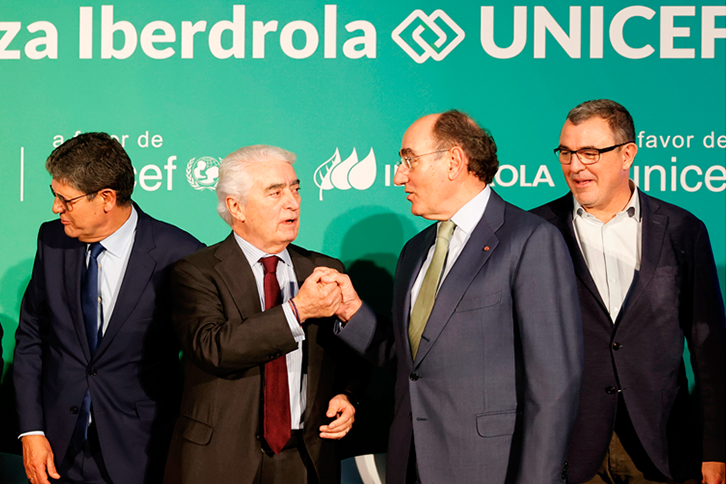Human rights
Respect for and defence of human rights: our commitment
We are committed to the protection and fulfilment of human rights, with the aspiration of helping to build a more sustainable world. From this standpoint, Iberdrola has the necessary tools to guarantee and promote these principles.
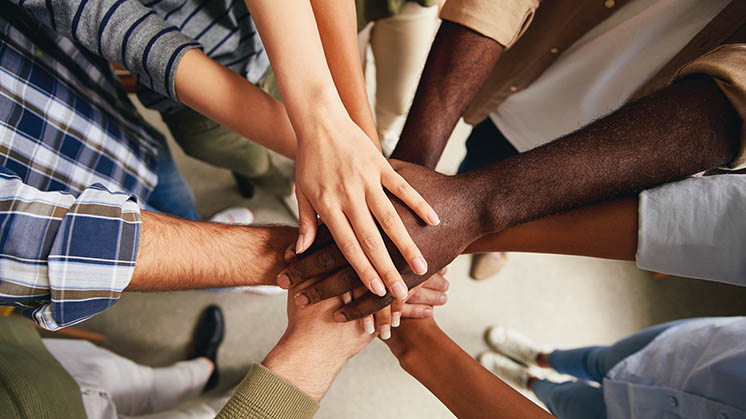
At Iberdrola we are firmly committed to respect for human rights. For this reason, we have a set of tools in place that guarantee and promote the protection and respect of people, with the aim of preventing, mitigating and remedying any potential impact.
Human rights management at Iberdrola is aligned with the main international standards:
- Universal Declaration of Human Rights
- United Nations Guiding Principles on Business and Human Rights.
- OECD Guidelines for Multinational Enterprises on Responsible Business Conduct
- Principles of the United Nations Global Compact.
- ILO Tripartite Declaration of Principles concerning Multinational Enterprises and Social Policy.
- International Labour Organization (ILO) Conventions, including Convention 169 on Indigenous and Tribal Peoples.
- United Nations Declaration on the Rights of Indigenous Peoples.
- United Nations Sustainable Development Goals.
At Iberdrola we have a firm commitment to the defence of human rights. This is reflected in two key instruments of our Governance and Sustainability System: the Ethical and basic principles of governance and sustainability and the Human rights respect policy. In addition, through our Code of conduct for directors, professionals and suppliers, we establish principles that guarantee ethical, responsible behaviour aligned with our Purpose and Values. These documents, approved by the Board of Directors, consolidate our responsibility as a Group.
We are committed to implementing robust, cross-cutting due diligence processes to identify, prevent, mitigate and remedy actual and potential adverse impacts; to integrate human rights throughout all phases of the life cycle of our projects; to periodically assess the effectiveness of our policies and processes; and to transparently communicate our progress and challenges.
This commitment is the result of years of work to integrate respect for and protection of human rights into our strategic planning and decision-making. We formalised this commitment in 2015 with the publication of our first Human Rights respect policy, which we review periodically – the most recent update was in March 2025 – to strengthen its content and adapt it to emerging challenges.
Through these instruments, we have undertaken, among others, the following commitments linked to international human rights standards:
- To respect the human and labour rights in accordance with national and international legislation and to apply international standards where regulation is insufficient.
- To respect human and labour rights recognised in national and international frameworks, always taking the most demanding standard as a reference.
- To respect the right to freedom of movement within each country or territory and to reject child labour and forced or compulsory labour or any other form of modern slavery, also ensuring and promoting the elimination of such situations within its supply chain.
- To respect freedom of association and collective bargaining, as well as non-discrimination and the rights of ethnic minorities and indigenous peoples.
- To respect the right to a clean, healthy and sustainable environment, particularly to safeguard children’s rights.
- To recognise access to energy and natural resources, including water, as a human right, collaborating in the protection of vulnerable customers and plans for communities without access.
- To assume the universality and interdependence of human rights and guarantee their protection through due diligence processes in all relationships with stakeholders.
- To promote a culture of respect for human rights and raise awareness among its professionals across all Group companies, especially in those where the risk of infringement may be higher.
- Furthermore, to transmit to all stakeholders the importance of respecting human and labour rights recognised in national and international legislation and to demand the same commitment from all business partners.
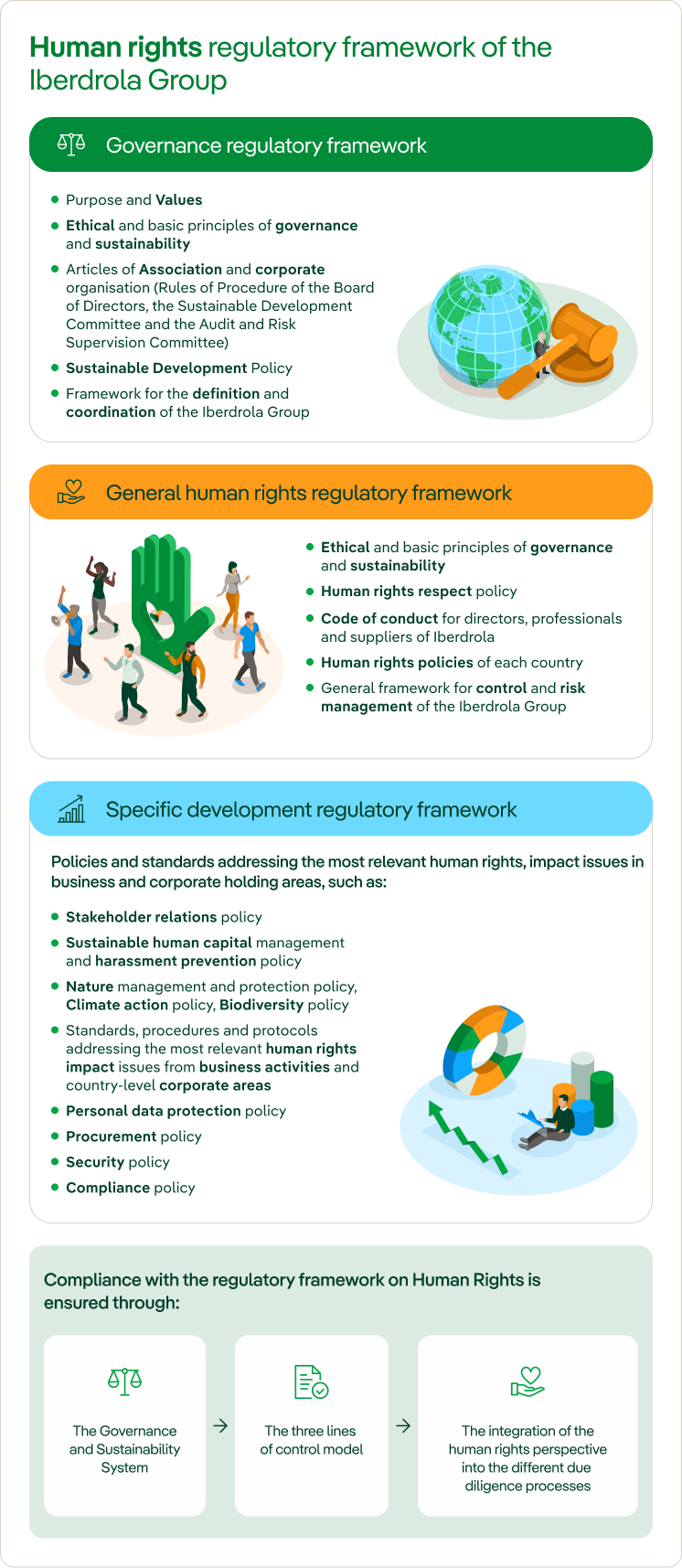

 SEE INFOGRAPHIC: Human rights regulatory framework of the Iberdrola Group [PDF]
SEE INFOGRAPHIC: Human rights regulatory framework of the Iberdrola Group [PDF]
Human rights due diligence at Iberdrola
Respecting and protecting human rights goes far beyond regulatory compliance issues.
For us, due diligence is a continuous, dynamic and cross-cutting process that enables us to identify and manage actual or potential risks and adverse impacts arising from our operations at all stages (planning, construction, operation, maintenance and closure), as well as from our business relationships and value chain. In addition, we integrate dialogue and transparency mechanisms with our stakeholders.
We have been implementing Human Rights Due Diligence processes for years, based on a broad definition of human rights and supported by various subsystems and procedures (Compliance, Health and Safety, Environment, Procurement and Cybersecurity, among others). Each year we assess whether these subsystems adequately cover the issues from a human rights perspective, with the aim of ensuring autonomous and efficient management in each area under an integrated vision.
This process is the operational backbone of our Human Rights Respect Policy and our Ethical and basic principles of governance and sustainability and applies to all areas of the Group, subsidiaries and investee companies under our control.
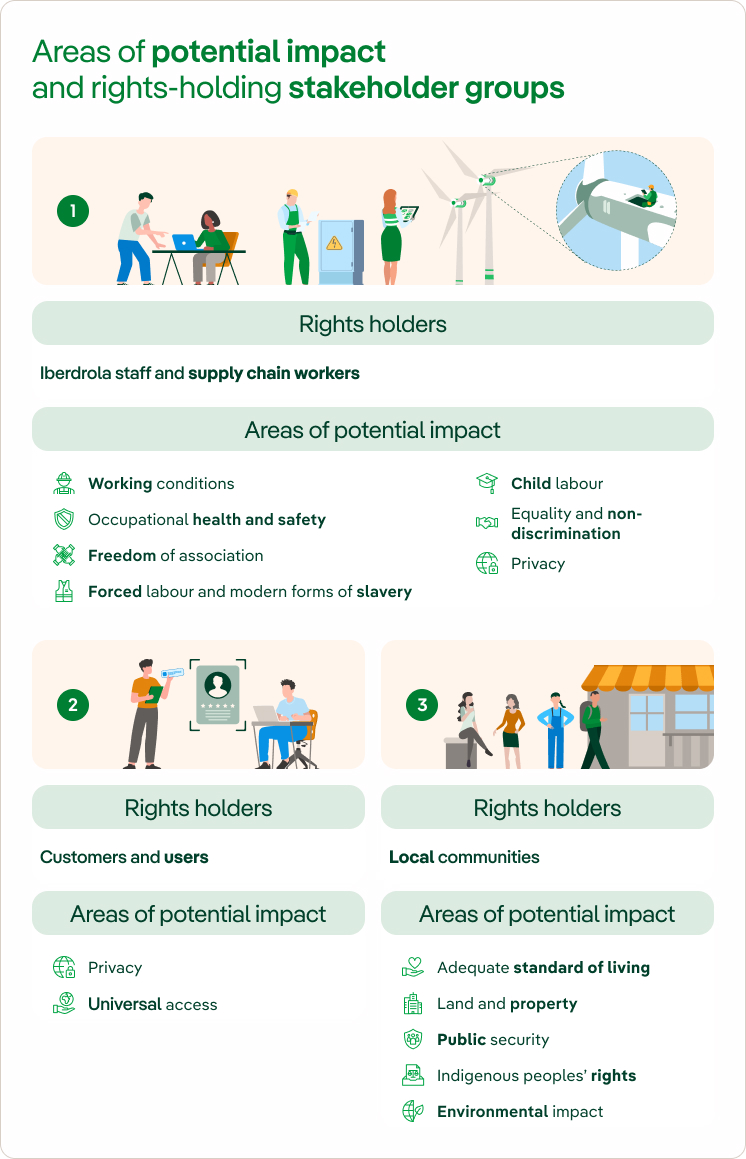

 SEE INFOGRAPHIC: Areas of potential impact and rights-holding stakeholder groups [PDF]
SEE INFOGRAPHIC: Areas of potential impact and rights-holding stakeholder groups [PDF]
Each year we review and update the risk map by business and country. These data are cross-checked against the list of each business’s main operating centres to identify facilities where there may be a higher risk of human rights violations.
Iberdrola carries out a human rights risk analysis at 100% of its main operating centres (378 centres in total). As a result of this analysis during 2024, in 60% of these centres, located in the United States, Brazil, Mexico or Greece, risk was identified in one or more of the following human rights issues: working conditions, environmental impact, occupational health and safety, public security, indigenous peoples or land and property.
Whenever a risk or impact is identified, the due diligence system includes the design and implementation of appropriate measures for its prevention and mitigation. Environmental impact mitigation plans included in construction and operating licences for our facilities are a clear example of mitigating measures, as there is a correlation between environmental impacts and human rights impacts.
Once the main challenges have been identified, solid due diligence processes and practices are applied and it is ensured that the results are taken into account in decision-making and strategy formulation.
The main human rights challenges are found in:
- Reviewing operating procedures at Group facilities to assess their level of alignment with the recommendations of the United Nations Guiding Principles regarding the management and mitigation of any potential impacts on local communities.
- Reviewing grievance and complaints mechanisms, as well as formalising their classification, monitoring and control, with the aim of facilitating access to effective remedy mechanisms for victims (third pillar of the Ruggie Framework1).
- Strengthening human rights due diligence within the supply chain, with particular focus on the abolition of forced labour at all levels of the chain and with the long-term objective of implementing joint management (shared responsibility) of human rights due diligence with suppliers.
At Iberdrola we attach great importance to fostering a culture based on knowledge of and respect for human rights. For this reason, the company carries out various periodic internal and external human rights training and awareness-raising activities for different stakeholders.
For a fair, transparent, and ethical value chain
Suppliers are strategic players within the Iberdrola Group and, as such, are considered business partners. At all times, the company seeks to guarantee a fair, transparent and ethical value chain. What’s more, the procurement function ensures the availability of the necessary mechanisms to guarantee a fair, transparent and ethical value chain.
In supplier management and during the procurement process, the measures adopted by the Company to protect human rights are based on the Purchasing Policy, the Iberdrola Code of conduct for directors, professionals and suppliers and the specific sustainability and human rights clauses included in the contractual terms accompanying issued purchase orders. In this way, suppliers commit to the principles of social responsibility and respect for human rights.
1 “Protect, Respect, Remedy”, “Ruggie Framework”, refers to the United Nations framework on Business and Human Rights – “Protect, Respect, Remedy”, developed by John Ruggie, an academic and diplomat, which establishes the State’s duty to protect human rights, companies’ responsibility to respect them (not to cause harm and to carry out due diligence) and the need for access to remedy for victims.
During the term of the contract, the provider must allow Iberdrola to review the degree of compliance with the principles established in the contracts and, if breaches are detected and no corrective plans are adopted, the company reserves the right to cancel them.
Iberdrola periodically analyses purchases made in countries considered at risk for not having ratified the ILO conventions on forced labor, freedom of association and collective bargaining, and child labor; as well as those countries to which, having ratified said conventions, observations have been made that reveal weaknesses in the application of the aforementioned conventions.
And, for this, the Company makes different resources and materials available to suppliers, such as an online awareness module on Human Rights and business.
Iberdrola reports on the development of its activities, as well as the measures it implements to repair, mitigate or remedy any impacts caused during the process, responding to its stakeholders through the Non-Financial Information Statement and addressing indices, observatories and enquiries received through the various channels in place.
Recognition
As a result of its commitment, Iberdrola has once again been recognised as best in class in the ranking of the world’s largest renewable energy companies in terms of human rights. This is the Renewable Energy Companies and Human Rights report, prepared by the Business & Human Rights Resource Centre, which assesses the 15 largest listed wind and solar power generation companies worldwide and covers issues such as labour rights, the right to a clean and healthy environment and community rights, among others.
In addition, the company has once again been included in the Dow Jones Best-in-Class World Index, being the only European utility included across its 25 editions, and is considered one of the most sustainable utilities in the world. The company has also been recognised by the Workforce Disclosure Initiative among the top 10% of highest-scoring companies, included in Equileap’s Global Top 100 for gender equality in 2025 and awarded the WomenCEO Award 2025.
We publish our Human rights report
At Iberdrola we have a firm commitment to human rights. For this reason, we publish our Human Rights Report 2025 [PDF], which shows how we work to ensure respect for these principles across all our activities and relationships. Since approving our Policy in 2015, we have made progress in identifying, preventing and mitigating impacts, in line with the UN Guiding Principles. This effort positions us as sustainability leaders, recognised by indices such as the Dow Jones Sustainability Index, the Dow Jones Best-in-Class World Index and the Renewable Energy and Human Rights Index.
See previous reports

Human Rights Day
A day to commemorate the Universal Declaration of Human Rights.

Our policy
Discover our Policy on Respect for Human Rights.

We promote responsible management
We integrate environmental, social and governance (ESG) factors.

Committed to the SDGs
Our commitment to the Sustainable Development Goals.





